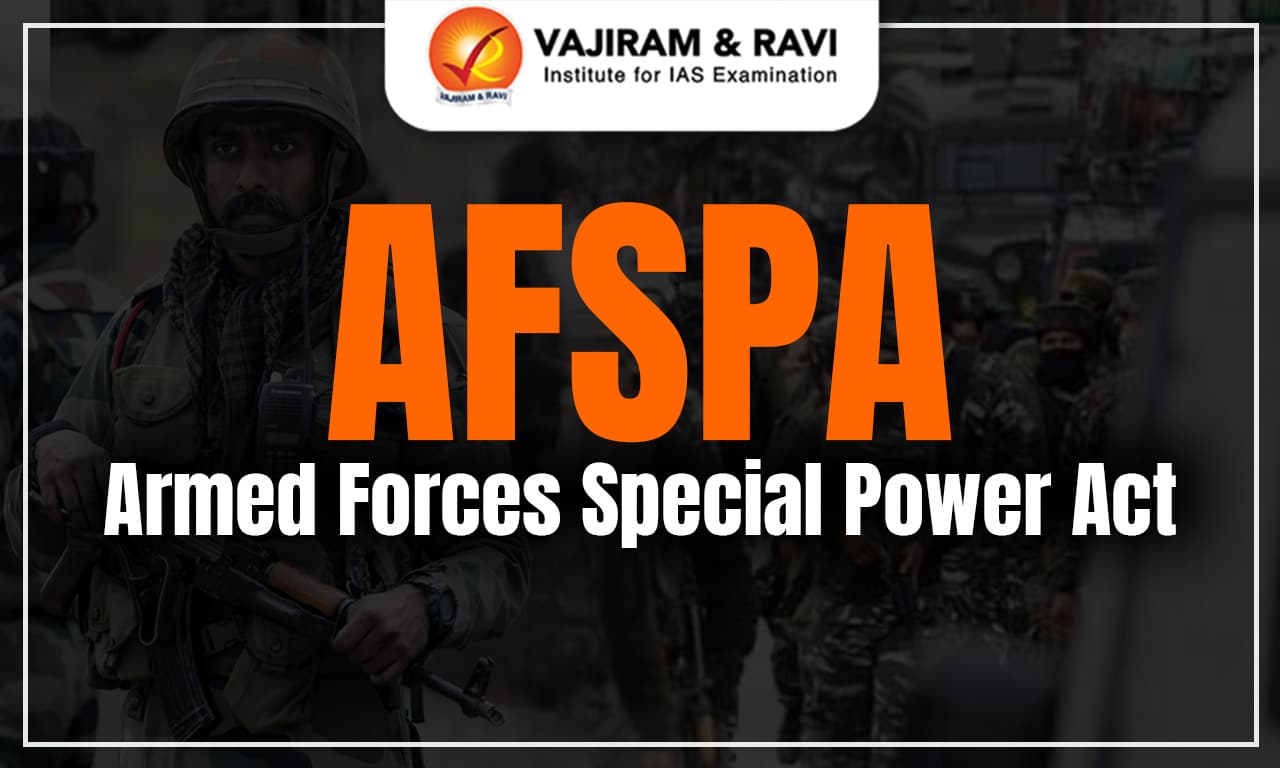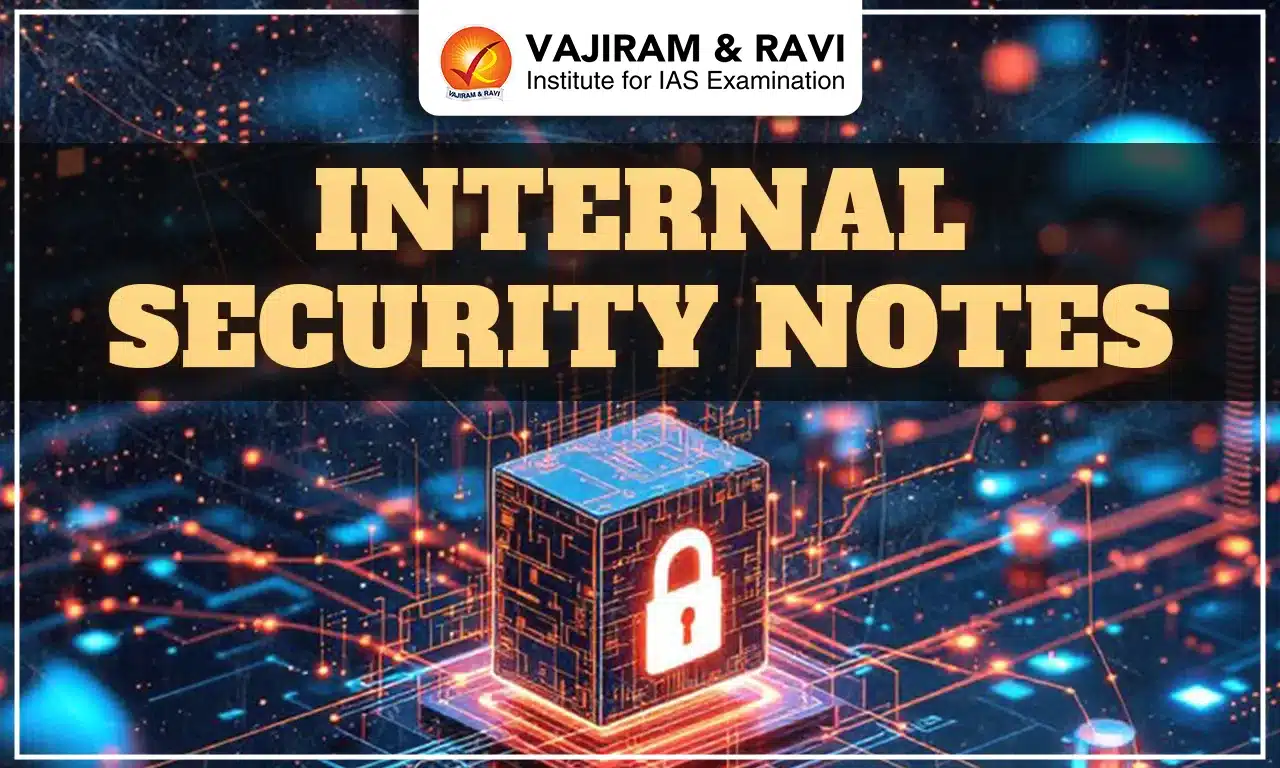Armed Forces Special Power Act (AFSPA) is a key piece of legislation that allows military forces to have special powers in areas defined as 'disturbed zones.' This legislation was enacted in 1958 to strengthen the military and paramilitary forces' ability to maintain public order and battle insurgency in areas with serious security concerns.
AFSPA has been the topic of heated debates and controversy, with many criticising it for granting the military vast powers that some claim can lead to human rights breaches.
What is AFSPA?
Armed Forces Special Powers Act (AFSPA), introduced in 1958, is a contentious law in India that grants sweeping powers to the armed forces in regions labeled as "disturbed."
- It allows security personnel to use force, open fire after issuing warnings, conduct arrests without warrants, and search properties based on suspicion.
- Additionally, it offers legal protection to personnel for actions taken during operations in these areas.
- AFSPA is typically enforced in areas experiencing insurgency or internal conflict that poses a risk to national sovereignty. The authority to designate an area as "disturbed" rests with both the central and state governments.
AFSPA Historical Background
AFSPA was conceived by British authorities under Viceroy Linlithgow to suppress the 'Quit India' movement. It empowered the armed forces with exceptional authority to uphold public order in regions designated as "disturbed areas." Three such acts have been passed by the Indian Parliament under the AFSPA for various regions.
Armed Forces Special Powers (Assam and Manipur) Act, 1958
AFSPA, 1958, has its legislative roots in the Armed Forces (Special Powers) Act of 1948. It was reintroduced in 1958 due to the deteriorating internal security situation in “unified Assam”.
- The Nagas, inhabiting the Naga Hills of Assam and Manipur, opposed the merger into India, raising the banner of revolt. They started committing violent acts against the Indian state.
- In response to the escalating Naga insurgency, which the Assam Rifles and local police failed to control, the Naga Nationalist Council (NNC) established a parallel authority—the Federal Government of Nagaland—on March 22, 1956.
- This compelled the President of India to promulgate the Armed Forces (Assam and Manipur) Special Powers Ordinance in 1958 regarding the ‘disturbed areas’ of Assam and the Union Territory of Manipur.
- Subsequently, a bill was introduced to replace the original ordinance, which was passed into law after facing limited parliamentary opposition.
Armed Forces (Punjab and Chandigarh) Special Powers Act, 1983
The Armed Forces (Punjab and Chandigarh) Special Powers Act, 1983 empowered central forces to combat the Khalistan movement by granting them special powers, including vehicle seizure and lock-breaking. Initially enforced in 1983, it was later withdrawn from Punjab in 1997 and eventually nullified in Chandigarh by the High Court in 2012.
Armed Forces (Jammu and Kashmir) Special Powers Act, 1990
The Armed Forces (Jammu and Kashmir) Special Powers Act, 1990 was enacted to counter rising militancy in the region.The Act grants extensive powers to security forces in regions marked as disturbed and continues to be operational despite ongoing criticism. Even after the lapse of J&K’s Disturbed Areas Act in 1998, AFSPA continues under its provisions.
Armed Forces Special Power Act Key Provisions
Armed Forces (Special Powers) Act (AFSPA) grants specific powers to the armed forces in areas declared as "disturbed." Its key provisions are mentioned under Sections 3, 4, 5 and 6 of the Act. Several features of these sections are:
- Power to Declare Disturbed Areas: A State Governor, Union Territory Administrator, or the central government may designate any region as a ‘disturbed area’ if they deem it necessary for armed forces to support civil authorities.
- Governor's Power: The Governor has the authority to declare any area within the State as 'disturbed'. This decision must be based on clear legislative guidelines and cannot be arbitrary (Inderjit Barua v. State of Assam, 1983).
- Time Limit on Declarations: Declarations of 'disturbed areas' must be periodically reviewed and cannot be indefinite. Reviews should occur before the six-month period expires (Naga People’s Movement of Human Rights v. Union of India, 1998).
- Extraordinary Authority of Armed Forces: In regions declared as disturbed, security personnel are granted specific powers to:
- Use force, including lethal force, against those violating laws prohibiting assembly or carrying weapons.
- Destroy arms dumps, fortified positions, or shelters used for attacks or training camps for armed volunteers.
- Detain any individual suspected of a cognizable offense without the need for a formal arrest warrant.
- Enter and search premises without a warrant to arrest suspects or recover stolen property, arms, or explosives.
- Legal Protection for Acting Personnel: No legal proceeding (prosecution, suit, etc.) can be initiated against anyone acting under this Act without the prior sanction of the Central Government.
AFSPA Need
AFSPA is essential for enabling swift counterinsurgency operations, securing border regions, supporting weak civil administrations, ensuring rapid response, protecting armed forces from legal harassment, and maintaining long-term stability in conflict-prone and disturbed areas of India.
- Counterinsurgency Operations: AFSPA provides armed forces with essential powers to tackle insurgency and terrorism in disturbed areas, enabling swift action without procedural delays, which is critical for maintaining internal security and protecting civilians.
- Support in Border States: In border regions like Jammu & Kashmir and the Northeast, AFSPA helps counter cross-border terrorism, arms smuggling, and infiltration, ensuring national security in geopolitically sensitive and hostile environments.
- Rapid Response Capability: AFSPA allows security forces to respond quickly to threats without waiting for warrants or approvals, crucial in preventing large-scale violence and neutralizing militants during ambushes or intelligence-led operations.
- Protection for Armed Forces: The Act provides legal immunity to security personnel acting in good faith, protecting them from frivolous litigation and enabling them to operate without fear while maintaining peace in disturbed zones.
- Long-Term Strategic Stability: AFSPA helps maintain strategic stability in regions affected by prolonged militancy, creating a secure environment for development, dialogue, and the gradual return of normalcy and democratic processes.
Armed Forces Special Power Act Current Status
The Armed Forces (Special Powers) Act (AFSPA) remains in effect across several northeastern states of India, with recent extensions highlighting its controversial status. Currently, AFSPA is active in Assam, Manipur, Nagaland, Arunachal Pradesh and UT of J&K. It was fully withdrawn from Mizoram in the 1980s, Tripura in 2015, and Meghalaya in 2018.
- As of April 2025, the Central government has extended AFSPA for six months in Manipur (excluding areas under 13 police stations), Nagaland (covering eight districts and parts of five others), and Arunachal Pradesh (Tirap, Changlang, Longding, and parts of Namsai district) due to ongoing security concerns.
- Despite a relative calm in some areas, the law persists in regions deemed "disturbed," granting armed forces special powers to maintain public order. However, this extension has drawn criticism.
- The Naga Students' Federation condemned the move as a violation of democratic aspirations and called for AFSPA's complete repeal, citing its impact on human rights and peace efforts
Supreme Court on AFSPA
The Supreme Court of India has upheld the constitutional validity of AFSPA but emphasized that the armed forces must act within the law, and any misuse or excesses under the Act are subject to judicial review. These are primary verdicts given by the Supreme Court related to AFSPA:
- Supreme Court Verdict of 1998: In Naga People’s Movement of Human Rights vs. Union of India, the Court upheld AFSPA’s constitutional validity, but mandated that ‘disturbed area’ status be reviewed every six months and that armed forces use only the minimum necessary force under Section 4.
- July 2016 Judgment: The Supreme Court directed that even in AFSPA-imposed regions, security forces must not use excessive or retaliatory force, reinforcing accountability and human rights protection in disturbed areas.
- July 2017 Judgment (Manipur Encounters): Overruling objections from the Centre and Army, the Supreme Court ordered the CBI to form an SIT to investigate alleged fake encounters in Manipur, setting a precedent for judicial oversight on AFSPA-related actions.
AFSPA Criticism
AFSPA has been consistently criticized for facilitating human rights abuses, curbing dissent, lacking proper accountability, causing psychological trauma to civilians, and distancing local communities—raising serious questions about its effects on democracy, justice, and lasting peace.
- Opposition During Introduction: During the 1958 parliamentary debates, MPs expressed concerns over AFSPA. They warned it could violate fundamental rights, bypass emergency procedures, undermine civilian authority, and allow unchecked abuses by security forces.
- Human Rights Violations: AFSPA has often been linked to grave human rights violations, including extrajudicial killings and torture by security forces, especially in states like Manipur and Jammu & Kashmir, sparking national and international criticism.
- Lack of Accountability: The immunity granted under AFSPA has led to a lack of accountability, as security personnel cannot be prosecuted without central government sanction, resulting in very few convictions despite serious allegations.
- Suppression of Dissent: The law has allegedly been misused to suppress political dissent and peaceful protests, branding activists and local leaders as threats to security, thereby stifling democratic voices in conflict-prone areas.
- Psychological Impact on Civilians: The constant presence of armed forces and sweeping powers under AFSPA have led to fear, trauma, and mental health issues among civilians living in disturbed areas, disrupting normal life for decades.
- Alienation of Local Population: The prolonged application and misuse of AFSPA have fostered deep resentment and mistrust between local populations and the government, often pushing youth towards extremism instead of curbing insurgency.
AFSPA Way Forward
The way forward for AFSPA includes aligning it with constitutional safeguards, involving states in ‘disturbed area’ declarations, ensuring civilian oversight, adopting scientific criteria, and considering its repeal as recommended by expert committees.
- Alignment with Article 22: The army should comply with Article 22 of the Indian Constitution, which mandates presenting any arrested person before a magistrate within 24 hours. The police must inform a relative or friend about the arrest and its cause, as per the constitutional provision.
- Scientific Criteria for ‘Disturbed Areas’: A clear, evidence-based methodology should be developed, in consultation with states, to determine when an area qualifies as ‘disturbed’ and ensure regular reviews to avoid prolonged misuse of powers.
- Greater State Participation: States should be actively involved in declaring or revoking ‘disturbed area’ status, shifting from unilateral decisions by the Centre to cooperative federalism, enhancing legitimacy and local accountability.
- Civilian Control over Military: Establishing strong civilian oversight of military actions under AFSPA can curb excesses and improve accountability. Independent review boards and human rights commissions should be given real powers to investigate complaints.
- Abolition: Implement recommendations of the Justice Jeevan Reddy Committee and the Second Administrative Reforms Commission (2nd ARC Report), which advocated for either the repeal or major overhaul of AFSPA to align it with democratic principles.
AFSPA UPSC PYQs
Q1. Human rights activists constantly highlight the fact that the Armed forces (Special Powers) Act, 1958 (AFSPA) is a draconian act leading to cases of human rights abuses by security forces. What sections of AFSPA are opposed by the activists? Critically evaluate the requirement with reference to the view held by the Apex Court. (UPSC Mains 2015)
Last updated on February, 2026
→ UPSC Notification 2026 is now out on the official website at upsconline.nic.in.
→ UPSC IFoS Notification 2026 is now out on the official website at upsconline.nic.in.
→ UPSC Calendar 2026 has been released.
→ UPSC Final Result 2025 is expected to be released in the second week of April 2026.
→ Check out the latest UPSC Syllabus 2026 here.
→ Join Vajiram & Ravi’s Interview Guidance Programme for expert help to crack your final UPSC stage.
→ UPSC Mains Result 2025 is now out.
→ UPSC Prelims 2026 will be conducted on 24th May, 2026 & UPSC Mains 2026 will be conducted on 21st August 2026.
→ The UPSC Selection Process is of 3 stages-Prelims, Mains and Interview.
→ Prepare effectively with Vajiram & Ravi’s UPSC Prelims Test Series 2026 featuring full-length mock tests, detailed solutions, and performance analysis.
→ Enroll in Vajiram & Ravi’s UPSC Mains Test Series 2026 for structured answer writing practice, expert evaluation, and exam-oriented feedback.
→ Join Vajiram & Ravi’s Best UPSC Mentorship Program for personalized guidance, strategy planning, and one-to-one support from experienced mentors.
→ Check UPSC Marksheet 2024 Here.
→ UPSC Toppers List 2024 is released now. Shakti Dubey is UPSC AIR 1 2024 Topper.
→ Also check Best UPSC Coaching in India
Armed Forces Special Power Act FAQs
Q1. How many states have AFSPA currently?+
Q2. Is AFSPA still in Manipur?+
Q3. What is AFSPA in India?+
Q4. Who brought AFSPA in Kashmir?+
Q5. What is the Armed Forces Special Powers Act 1990?+
















